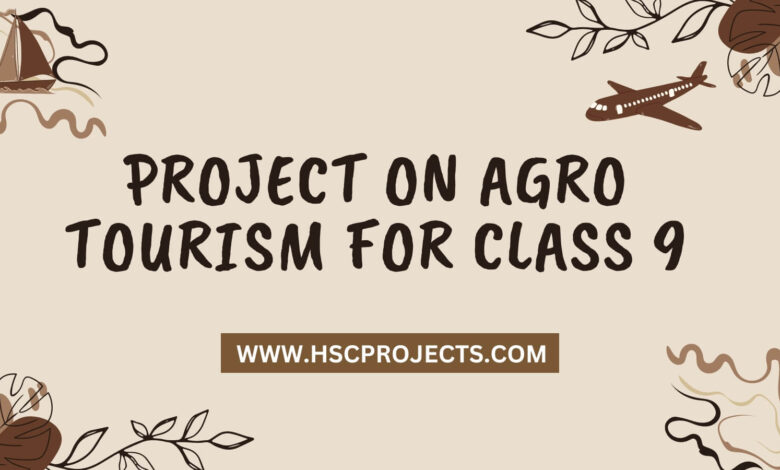
Project On Agro Tourism For Class 9
Introduction To Agro-tourism
Agrotourism is a form of ecotourism that emphasises experiences and activities related to agriculture. In order to learn about farming methods, food production, and rural living, it involves visiting farms, ranches, vineyards, and other agricultural companies. Agrotourism aims to give visitors a distinctive and genuine experience while promoting and supporting nearby agricultural businesses. People can be better informed about the value of sustainable agriculture and its significance to our food systems. Agrotourism has grown in popularity over the past several years as more people want for immersive travel experiences that allow them to connect with the land and wildlife.

Importance Of Agro-tourism In Rural Development
By bringing benefits to local communities on an economic, social, and environmental level, agrotourism plays a significant part in rural development. It generates cash for nearby farms and companies, as well as employment opportunities for residents of rural areas. Agrotourism can also support sustainable farming methods and the preservation of cultural heritage.
Agrotourism can promote the expansion of other regional industries including handicrafts, food processing, and transportation services by drawing tourists to rural areas. This can therefore result in more economic activity and higher living standards for rural areas.
As locals demonstrate their distinctive cultural and agricultural heritage to tourists, agrotourism has the potential to strengthen local citizens’ sense of pride and community. By encouraging respect and understanding among both urban and rural people, this can also assist to strengthen relationships between them.
Finally, by encouraging environmentally friendly farming methods and conservation initiatives, agrotourism can also have positive effects on the environment. Agrotourism may inform visitors about the value of protecting natural resources and fostering biodiversity by displaying sustainable farming practises. Overall, agrotourism has the potential to dramatically advance sustainable tourism methods and support rural development.
Types Of Agro-tourism Activities
Depending on the region, the nature of the farm or agricultural enterprise, and the interests of the tourists, agrotourism activities can change. Typical agro-tourism activities include the following:
Farm tours: Visitors can take guided tours of farms to learn about various farming techniques, animal husbandry, and the processes involved in producing food.
Harvesting activities: Visitors can take part in harvesting tasks like gathering fruits, vegetables, and herbs or harvesting grains like wheat and rice.
Interactions with animals: People can get up close and personal with animals including cows, sheep, goats, and chicks while learning about animal husbandry techniques.
Wine and cheese tasting: Visitors can sample wines, cheeses, and other specialty culinary items while also learning about how they are made.
Rural lodging: To experience rural life and learn more about the local culture and traditions, travellers can stay in rural lodgings including farmhouses, guesthouses, and lodges.
Workshops and lessons: People who visit can take part in workshops and classes in cooking, gardening, and handicrafts.
Festivals and events: To understand more about regional customs and culture, tourists can go to festivals and events including harvest festivals, food fairs, and agricultural exhibits.
These are only a handful of the numerous agro-tourism activities that are offered. The location and tourist interests will determine the kind of activity.
Advantages Of Agro-tourism For Farmers And Rural Communities

For farmers and rural areas, agrotourism can offer a number of benefits. Some of them are as follows:
Additional income: Agrotourism can help farmers generate extra cash by diversifying their sources of revenue. This can assist them in reducing the hazards associated with farming and improving their financial security while stabilising their income.
Job creation: Agrotourism has the potential to provide jobs for locals, particularly in rural areas where employment options may be few.
Opportunities for marketing: Farmers can use agrotourism to sell their goods directly to customers, cutting out middlemen and boosting earnings.
Preservation of agricultural land: Agrotourism can aid in the preservation of agricultural land and the promotion of environmentally friendly farming methods, which can help to save the environment and preserve natural resources.
Cultural preservation: By exhibiting local customs to tourists, agrotourism can aid in the preservation of regional culture and traditions. This may contribute to fostering community spirit and local pride.
Enhanced awareness: Agrotourism can aid in enhancing public understanding of the value of agriculture and the part it plays in our food systems. People can learn more about where their food comes from and sustainable agriculture practises can be promoted as a result.
Overall, agro-tourism may benefit farmers and rural communities in a number of ways, including by increasing their income, creating jobs, opening up new marketing options, protecting the environment, preserving their culture, and raising public awareness of the value of agriculture.
Challenges Faced In Promoting Agro-tourism
While agro-tourism has a lot to offer, advertising it comes with a lot of difficulties. The following are some typical difficulties:
Lack of infrastructure: It’s possible that rural areas lack the services, such as transportation, lodging, and communication, to support agrotourism.
Limited resources: It’s possible that many farmers lack the financial means or technical know-how to create agrotourism ventures or make the necessary infrastructure investments.
Seasonal nature of agriculture: Agriculture is a seasonal industry, thus it can be challenging to draw tourists throughout the year when agrotourism activities are restricted to particular seasons of the year.
Competition from other locations: Agrotourism locations may endure competition from other tourist locations that provide comparable experiences or activities.
Lack of knowledge and marketing: There may not be enough marketing and promotional efforts to draw in many potential tourists, and agrotourism may not be well known as a viable travel alternative.
Regulatory obstacles: It can be challenging to manage the rules governing land use, zoning, and health and safety that may apply to agrotourism activities.
Balancing commercialization with preservation: A fine balance may need to be struck between the commercialization of agrotourism and the preservation of the agricultural land and the customs that give the experience its distinctive character.
Overall, agro-tourism promotion might be difficult, but with careful preparation and funding, it can benefit rural communities, farmers, and tourists greatly.
Successful Examples Of Agro-tourism In Different Countries
Agrotourism is practised successfully in numerous nations throughout the world. Here are a few illustrations:
Italy: Agritourism is a well-liked kind of rural tourism in Italy, where guests can observe customary farming methods, sample regional cuisine and wine, and stay in farmhouses and rural lodging.
Japan: Travellers can engage in traditional handicrafts, cultural events, and rural life while learning about traditional farming methods including rice cultivation and tea production.
Costa Rica: Costa Rica has created a successful model of sustainable agro-tourism that allows travellers to experience rural life and cultural traditions while learning about organic farming methods and conservation efforts.
India: Visitors can engage in agricultural activities like harvesting and raising cattle as well as learn about traditional handicrafts and cultural practises through rural tourism in India.
Australia: Farm tours, wine tastings, and hotels in the country are all part of the country’s agro-tourism offerings. Along with experiencing and learning about Indigenous traditional practises, visitors can also enjoy Aboriginal music and art.
Canada: With activities like maple syrup production, berry picking, and farm tours, Canada has created a successful model of agro-tourism. Additionally, visitors can experience cultural activities and lodging in the countryside.
These are only a few illustrations of the many nations’ effective agro-tourism models. Through agrotourism activities, visitors can learn about the distinctive cultural and agricultural traditions of each nation.
Role Of Government In Promoting Agro-tourism
The government can do a lot to encourage agricultural tourism. The following are a few ways the government can aid in promoting agrotourism:
Policy assistance: To encourage farmers to invest in agro-tourism ventures, the government may offer policy support, such as tax incentives, subsidies, and regulatory support.
Infrastructure development: To encourage agrotourism, the government may make investments in the construction of transportation, communication, and road infrastructure.
Marketing and promotion: The government can support the growth of agrotourism by funding marketing and advertising initiatives like trade exhibitions.
Training and capacity development: To help farmers and rural communities acquire the skills and knowledge required to partake in agro-tourism operations, the government can offer training and capacity building programmes.
Research and development: The government can fund research and development to assist farmers in creating novel agro-tourism ventures and to find the most effective strategies for long-term agro-tourism.
Collaboration and partnerships: To develop and promote agro-tourism activities, the government can support collaboration and partnerships between farmers, regional communities, and tourism organisations.
Overall, through supporting policies, investing in infrastructure, marketing and promotion, training and capacity building, research and development, collaboration and partnerships, and marketing, the government can play a significant role in developing agro-tourism. By doing this, the government can support inclusive economic growth that is sustainable in rural areas while conserving local customs and culture.
Future Prospects Of Agro-tourism
Future prospects for agrotourism are bright since it provides travellers with a distinctive and genuine vacation experience that is growing in popularity. Here are a few agrotourism chances for the future:
Sustainable tourism: Tourism that is environmentally benign and sustainable: Agrotourism encourages the preservation of local culture and natural resources.
Economic development: By giving farmers and local populations employment possibilities, agrotourism can help rural areas’ economies expand.
Tourism product diversification: Agrotourism provides a distinctive and varied tourism offering that can complement other types of travel, such adventure travel and cultural travel.
Digitalization: By offering virtual tours, online booking services, and digital marketing, digital technology can improve the agrotourism experience.
Community engagement: By include local people in the design and execution of tourism activities, agrotourism can aid in fostering community involvement and empowerment.
Education and awareness: Agrotourism can aid in promoting education about the value of conserving regional culture and traditions as well as raising public understanding of sustainable agricultural practises.
In conclusion, agro-tourism has a promising future as a genuine and sustainable kind of travel that may support rural communities’ economic development while conserving regional customs and culture. Agrotourism can continue to develop and innovate with the correct regulations and investments, providing fresh and exciting opportunities for visitors and local people alike.
Conclusion: The Potential Of Agro-tourism For Sustainable Rural Development
Through its promotion of economic expansion, cultural retention, and environmental protection, agrotourism has the potential to make a significant contribution to sustainable rural development. It provides a distinctive and genuine tourism experience that is gaining popularity among travellers looking for a closer relationship with the environment and local culture.
In turn, this can assist to reduce poverty and promote sustainable economic growth by generating income opportunities for farmers and local communities. By displaying the distinctive practises, foods, and handicrafts of rural places, it can also aid in the preservation of regional culture and traditions. Additionally, it can support environmental protection by promoting sustainable agriculture methods and ethical travel practises.
The potential benefits make agro-tourism an attractive sector for investment and development even though there are obstacles to its promotion, such as a lack of infrastructure, marketing, and training. Governments, the corporate sector, and civil society can collaborate to create agrotourism activities that are profitable for both tourists and local populations while also being economically, socially, and environmentally sustainable.
As a result, agro-tourism has the potential to be a potent tool for sustainable rural development. With the correct investments and policies, it may also contribute to the establishment of a more inclusive and equitable tourist sector that is profitable for all parties.
Certificate of Completion
[Your Name][Your Class and Section][School Name][City, State][Date]This is to certify that I, [Your Name], a student of Class 9 at [School Name], have successfully completed the project on “Agro-tourism” under the guidance of our esteemed teacher, [Teacher’s Name]. This project was undertaken as part of our curriculum to understand sustainable rural development and the significance of agro-tourism in promoting it.
Throughout this project, I delved into the concept of agro-tourism, its importance in rural development, various agro-tourism activities, advantages for farmers and rural communities, challenges in promoting it, successful examples in different countries, the role of the government, and future prospects of agro-tourism. I thoroughly researched various aspects of agro-tourism and its potential to contribute to sustainable tourism and rural economies.
The journey of exploring agro-tourism has been enlightening and inspiring. I learned how agro-tourism can be a powerful tool for economic growth in rural areas by providing additional income to farmers and creating job opportunities for local communities. It was fascinating to discover how agro-tourism can preserve cultural heritage and promote sustainable farming practices while offering unique and authentic experiences to tourists.
I faced some challenges during the project, such as gathering data on successful agro-tourism initiatives in different countries and understanding the complexities of promoting agro-tourism in rural regions. However, with the guidance and support of my teacher, I overcame these challenges and successfully completed the project.
I would like to express my sincere gratitude to my teacher, [Teacher’s Name], for guiding me throughout the project and providing valuable insights and feedback. Their encouragement and support have been instrumental in my learning journey.
I would also like to thank my parents and friends for their continuous encouragement and motivation throughout the project.
Lastly, I am grateful to my school for providing me with this opportunity to explore sustainable tourism and agro-tourism as a means of rural development.
I am hopeful that the knowledge gained from this project will contribute to raising awareness about the importance of agro-tourism and its potential to support sustainable rural development.
[Your Name](Signature)
In order to download the PDF, You must follow on Youtube. Once done, Click on Submit
Follow On YoutubeSubscribed? Click on Confirm
Download Project On Agro Tourism For Class 9 PDF






